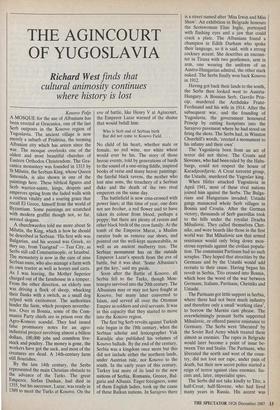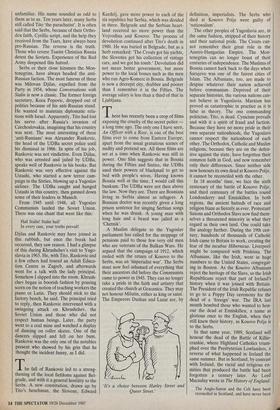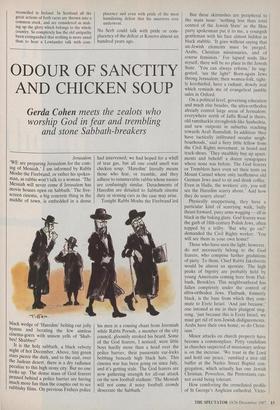THE AGINCOURT OF YUGOSLAVIA
Richard West finds that
cultural animosity continues where history is lost
Kosovo Polje A MOSQUE for the use of Albanians has been erected at Gracanica, one of the last Serb outposts in the Kosovo region of Yugoslavia. The ancient village is now merely a suburb of Prishtina, the teeming Albanian city which has arisen since the war. The mosque overlooks one of the oldest and most beautiful churches of Eastern Orthodox Christendom. The Gra- canica monastery was founded in 1313 by St Milutin, the Serbian King, whose Queen Simonida, is also shown in one of the paintings here. These biblical figures and Serb warrior-saints, kings, despots and emperors spring from the faded walls with a restless vitality and a soaring grace that recall El Greco, himself from the world of Byzantium. Some paintings are scratched with modern graffiti though not, so far, aerosol slogans.
A churchwarden told me more about St Milutin, the King, which is how he should be described in Serbian: 'His first wife was Bulgarian, and his second was Greek, so they say, from Tsarigrad' -- Tsar City, as Serbs still call Constantinople, or Istanbul. The monastery is now in the care of nine Serbian nuns, who also manage a farm with its own tractor as well as horses and carts. As I was leaving, the Mother Superior charged out of the farmhouse in a temper. From the other direction, an elderly nun was driving a flock of sheep, whacking their flanks with a switch, as a small dog yelped with excitement. The authorities hinder the farm, which prospers neverthe- less. Over in Bosnia, some of the Com- munist Party chiefs are in prison over the Agro-Komerc scandal. They had issued false promissory notes for an agro- industrial project involving almost a billion dollars, 100,000 jobs and countless live- stock and poultry. The money is gone, the workers have got the sack, and most of the creatures are dead. A 14th-century farm still flourishes.
By the late 14th century, the Serbs represented the main Christian obstacle to the advance of the Turks. The great Emperor, Stefan Dushan, had died in 1355, but his successor, Lazar, was ready in 1389 to meet the Turks at Kosovo. On the eve of battle, like Henry V at Agincourt, the Emperor Lazar warned of the shame that would befall him:
Who is Serb and of Serbian birth But did not come to Kosovo Field. . . .
No child of his heart, whether male or female, no red wine, nor white wheat would ever be his. The story of those heroic events, told by generations of bards to the sound of a one-string fiddle, inspired books of verse and many heroic paintings: the fateful black ravens, the mother who lost nine sons, the treachery of a Serbian duke and the death of the two rival emperors on the same day. The battlefield is now cuss-crossed with power lines; at this time of year, one does not see bozhur, a red flower said to have taken its colour from blood, perhaps a poppy; but there are plenty of ravens and other black birds of the crow family. At the tomb of the Emperor Murat, a Muslim curator bade us remove our shoes, and pointed out the well-kept memorabilia, as well as an ancient mulberry tree. The Serbian monument has on the outside Emperor Lazar's speech from the eve of battle, but it was shut. 'Some Albanian's got the key,' said my guide. Soon after the Battle of Kosovo, all Serbia fell to the Turks, though Mon- tenegro survived into the 20th century. The Albanians may or may not have fought at Kosovo, but many later converted to Islam, and served all over the Ottoman Empire as soldiers and civil servants. It was in this capacity that they started to move into the Kosovo region. The first big Serb revolts against Turkish rule began in the 19th century, when the Serbian scholar and lexicographer Vuk Karadjic also published his volumes of Kosovo ballads. By the end of the century, Serbia was a kingdom once more but this did not include either the northern lands, under Austrian rule, nor Kosovo to the south. In the early years of this century, Turkey lost more of its land to the new nations of Serbia, Romania, Greece, Bul- garia and Albania. Eager foreigners, some of them English ladies, took up the cause of these Balkan nations. In Sarajevo there is a street named after 'Miss Irwin and Miss Shaw'. An exhibition in Belgrade honours the Scotswoman Elsie Inglis, portrayed with flashing eyes and a jaw that could crack a plate. The Albanians found a champion in Edith Durham who spoke their language, so it is said, with a strong cockney accent. She describes an encoun- ter in Tirana with two gentlemen, arm in arm, one wearing the uniform of an Austro-Hungarian admiral, the other stark naked. The Serbs finally won back Kosovo in 1912.
Having got back their lands to the south, the Serbs then looked west to Austria- Hungary. A Bosnian Serb, Gavrilo Prin- cip, murdered the Archduke Franz- Ferdinand and his wife in 1914. After the subsequent war, and the founding of Yugoslavia, the government honoured Princip by cutting footprints into the Sarajevo pavement where he had stood on firing the shots. The Serbs had, in Winston Churchill's words, 'erected a monument to his infamy and their own'.
The Yugoslavia born from an act of terror did not thrive. The Croats and Slovenes, who had been ruled by the Habs- burgs, could not respect the house of Karadjeordjevic. A Croat terrorist group, the Ustashi, murdered the Yugoslav king.
When Hitler attacked Yugoslavia in April 1941, most of these rival nations joined him against the Serbs. The Bulga- rians and Hungarians invaded; Ustashi gangs massacred whole Serb villages in Bosnia and Croatia. After the German victory, thousands of Serb guerrillas took to the hills under the royalist Drazha Mihailovic. They called themselves Chet- niks, and wore beards like those in the first world war. But Mihailovic saw that armed resistance would only bring down mon- strous reprisals against the civilian popula- tion. The communist Partisans had no such scruples. They hoped that atrocities by the Germans and by the Ustashi would add recruits to their cause. Having begun his revolt in Serbia, Tito crossed into Bosnia, which bore the worst of the war between Germans, Italians, Partisans, Chetniks and Ustashi.
The Partisans got little support in Serbia, where there had not been much industry and therefore only a small 'working class', to borrow the Marxist cant phrase. The overwhelmingly peasant Serbs supported Mihailovic, or offered passive resistance to Germany. The Serbs were 'liberated' by the Soviet Red Army which treated them almost as enemies. The rapes in Belgrade would later become a point of issue be- tween Tito and Stalin. The Partisans, who liberated the north and west of the coun- try, did not loot nor rape, under pain of death, but their new secret police started a reign of terror against class enemies, fas- cists and, later, imperialist spies.
The Serbs did not take kindly to Tito, a half-Croat, half-Slovene, who had lived many years in Russia. His accent was unfamiliar. His name sounded as odd to them as to us. Ten years later, many Serbs still called Tito 'the parachutist'. It is often said that the Serbs, because of their Ortho- dox faith, Cyrillic script, and the help they received from the Tsars, have always been pro-Russian. The reverse is the truth. Those who revere Tsarist Christian Russia detest the Soviets. Experience of the Red Army deepened this hatred.
Serbs or their close kinsmen the Mon- tenegrins, have always headed the anti- Russian faction. The most famous of these was Milovan Djilas, expelled from the Party in 1954, whose Conversations with Stalin is now a classic. The former foreign secretary, Koca Popovic, dropped out of politics because of his anti-Russian stand. He wanted to maintain diplomatic rela- tions with Israel. Apparently, Tito had lost his nerve after Russia's invasion of Czechoslovakia, imagining that his country was next. The most interesting of these `anti-Russians' was Alexander Rankovic, the head of the UDBa secret police until his dismissal in 1966. In spite of his job, Rankovic was not vindictive. Even Djilas, who was arrested and jailed by UDBa, speaks well of Rankovic in his books. But Rankovic was very effective against the Ustashi, who started a new terror cam- paign in the Sixties, blowing up a Yugoslav airliner. The UDBa caught and hanged Ustashi in this country, then gunned down some of their leaders in Munich.
From 1945 until 1948, all Yugoslav Communists lauded the Soviet Union. There was one chant that went like this:
Hail Stalin! Stalin hail!
In every case, your truths prevail!
Djilas and Rankovic may have joined in this rubbish, but once the break had occurred, they saw reason. I had a glimpse of this during Khrushchev's visit to Yugo- slavia in 1963. He, with Tito, Rankovic and a few others had toured an Adult Educa- tion Centre in Zagreb, and afterwards went for a talk with the lady principal. Somehow I slipped into the room. Khrush- chev began in boorish fashion by pouring scorn on the notion of teaching workers the piano or Latin. They should stick to the factory bench, he said. The principal tried to reply, then Rankovic intervened with a swingeing attack on Khrushchev, the Soviet Union and those who did not respect human beings. Later, the party went to a coal mine and watched a display of dancing on roller skates. One of the dancers slipped and fell on her bum. Rankovic was the only one of the notables present who showed by his grin that he thought the incident funny, as I did.
The fall of Rankovic led to a streng- thening of the local fiefdoms against Bel- grade, and with it a general hostility to the Serbs. A new constitution, drawn up by Tito's henchman, the Slovene, Edward Kardelj, gave more power to each of the six republics bar Serbia, which was divided in three. Belgrade and the Serbian heart- land received no more power than the Vojvodina and Kosovo. The process of devolution continued after Tito's death in 1980. He was buried in Belgrade, but as a Serb remarked: 'The Croats got his yachts, the Slovenes got his collection of vintage cars, and we got his tomb.' Devolution did not mean better government, but more power to the local bosses such as the men who ran Agro-Komerc in Bosnia. Belgrade is now a decrepit city, drabber and poorer than I remember it in the Fifties. The average salary is less than a third of that in Ljubljana.
There has recently been a crop of films exposing the cruelty of the secret police a long time ago. The only one I have seen, An Officer with a Rose, is one of the best films ever to come from Eastern Europe; apart from the usual gratuitous scenes of nudity and pretend sex. All these films are set at a time when Rankovic was still in power. One film suggests that in Bosnia during the Fifties and Sixties, the UDBa used their powers of blackmail to get to bed with people's wives. Having known Bosnia well at the time, I would call this bunkum. The UDBa were not then above the law. Now they are. There are Bosnians living in Serbia almost as refugees. A Bosnian doctor was recently given a long prison sentence for singing Serbian songs when he was drunk. A young man with long hair and a beard was jailed as a `Chetnik'.
A Muslim delegate to the Yugoslav parliament has called for the stoppage of pensions paid to those few very old men who are veterans of the Balkan Wars. He argued that the campaign of 1912, which ended with the return of Kosovo to the Serbs, was an 'imperialist war'. The Serbs must now feel ashamed of everything that their ancestors did before the Communists came to power in 1945. They can no longer take a pride in the faith and artistry that created the church at Gracanica. They may not honour Milutin, either as king or saint. The Emperors Dushan and Lazar are, by `It's a choice between Harley Street and Queer Street.' definition, imperialists. The Serbs who died at Kosovo Polje were guilty of `nationalism'.
The other peoples of Yugoslavia are, in the same fashion, stripped of their history and their national pride. The Croats can- not remember their great role in the Austro-Hungarian Empire. The Mon- tenegrins can no longer boast of their centuries of independence. The Muslims of Bosnia cannot hark back to the days when Sarajevo was one of the fairest cities of Islam. The Albanians, too, are made to despise whatever their nation achieved before communism. Deprived of their separate histories, the various nations can- not believe in Yugoslavia. Marxism has proved as catastrophic in practice as it is false in theory. The one commanding politician, Tito, is dead. Cynicism prevails and with it a spirit of fraud and faction. Because they have no more pride in their own separate nationhoods, the Yugoslays cannot respect the nationhood of each other. The Orthodox, Catholic and Muslim religions, because they are on the defen- sive against the state, have forgotten their common faith in God, and now remember only their differences. Since neither side now honours its own dead at Kosovo Polje, it cannot be reconciled with the other.
In 18 months' time, we face the sixth centenary of the battle of Kosovo Polje, and third centenary of the battles round Londonderry and Enniskillen. In both regions, the ancient hatreds of race and religion blaze as fiercely as ever. Protestant Saxons and Orthodox Slays now find them- selves a threatened minority in what they regard as their own land. One could take the analogy further. During the 19th cen- tury, hundreds of thousands of Catholic Irish came to Britain to work, creating the fear of the incubus Hibernicus. Liverpool might be compared with Prishtina. The Albanians, like the Irish, went in huge numbers to the United States, congregat- ing in Boston. As the Kosovo Albanians reject the heritage of the Slays, so the Irish Republicans reject that part of Ireland's history when it was joined with Britain. The President of the Irish Republic refuses to go to a Poppy Day ceremony for the dead of a 'foreign' war. The IRA last month bombed those who wanted to hon- our the dead at Enniskillen, a name as glorious once to the English, when they still knew their history, as Kosovo Polje is to the Serbs.
In that same year, 1989, Scotland will honour the dead of the Battle of Killie- crankie, where Highland Catholics trium- phed over the Presbyterian Lowlanders, a reverse of what happened in Ireland the same summer. But in Scotland, by contrast with Ireland, the racial and religious en- mities that produced the battle had been forgotten a century later. As Lord Macaulay wrote in The History of England:
The Anglo-Saxon and the Celt have been reconciled in Scotland, and have never been
reconciled in Ireland. In Scotland all the great actions of both races are thrown into a common stock, and are considered as mak- ing up the glory which belongs to the whole country. So completely has the old antipathy been extinguished that nothing is more usual than to hear a Lowlander talk with com- placency and even with pride of the most humiliating defeat that his ancestors ever underwent.
No Serb could talk with pride or com- placency of the defeat at Kosovo almost six hundred years ago.












































































































 Previous page
Previous page